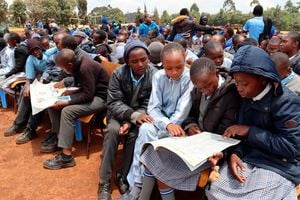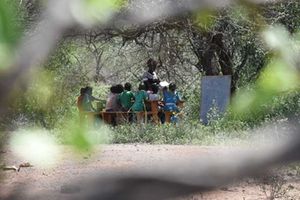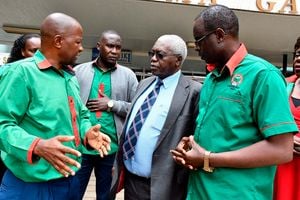
Education Cabinet Secretary Julius Ogamba (centre) during a capacity building workshop for Kenya Association of Technical Training Institutions (KATTI) in Mombasa on April 23 2025.
The change from referring to the ongoing educational reforms as competency-based curriculum (CBC) to competency-based education (CBE) caught many by surprise but fits into a pattern of amendments that have been made since the new system was introduced.
The change was widely publicised at a national forum on Thursday where, for the first time, the CBE branding on merchandise and other materials was used.
The Basic Education Curriculum Framework (BECF), on which the reforms are anchored and also outlines the structure of education, makes no mention CBE but rather talks of CBC. Basic Education Principal Secretary Julius Bitok said CBE covers all aspects of the system.
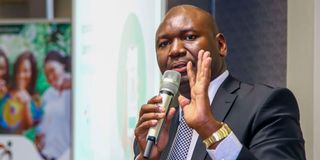
Basic Education Principal Secretary Julius Bitok.
Introduction of CBE also happened on the same day the Cabinet Secretary for Education Julius Ogamba announced yet another policy change that mathematics will be compulsory in senior school.
These are some of the latest in a litany of policy statements, decisions and reversals that have defined the reforms since they were rolled out in 2018.
Parents, teachers as well as other stakeholders have over the years complained about a lack of clarity in the educational reforms.
“Let us embrace the CBE. Initially we were talking about the CBC but now we have actually rebranded to CBE because we believe that curriculum was the entry point that was CBC but what we are implementing now is the CBE because we are looking at the infrastructure, curriculum, human resource that is teachers and the school set up.
“We are saying collectively this forms what we call CBE. When we were in Nakuru last week it was very clear there is a huge impact of CBE on the cycle of our education we could see the kind of talent our students displayed right from primary to Junior School, Secondary, Colleges and Universities...there is a lot of creativity, innovation and skilled impacted into our children and that is our main focus. There is a lot of difference even as we continue to rollout CBE education system,” said Mr PS Prof Julius Bitok during a meeting of education stakeholders in Nairobi.

Education Cabinet Secretary Julius Migos Ogamba during the County dialogue on education reforms at St Georges Primary School, Nairobi on March 13, 2025.
Some of the other controversial issues include earlier uncertainty over the domiciling of junior school, abolishing of boarding institutions, the offering of career pathways and subject clustering.
Others are staffing, the midway reviewing of subjects and revision of textbooks.
“CBC is too packed. There is a lot of confusion; just the other day the ministry announced mathematics is optional, but now it’s compulsory. The government is as confused as the parents. I don’t know what CBC aims to achieve,” said Caroline Mwasi, a parent.
Mr Silas Mwirigi, the Kagumo High School principal and chairman of the National Schools Forum, urged the government to consult stakeholders before effecting any changes in the sector.
“When you are doing any changes please consult us so that we can make our children learn well. We can give our honest and open opinion so that this country and our institutions can continue running smoothly,” said Mr Mwirigi.
“Mathematics, English and Kiswahili are crucial subjects, they should be made compulsory.”
He warned against compelling boarding national schools to allow day scholars to join Grade 10, 11 and 12.
“How are we going to control the discipline and the influence from outside? We are already over-stretched and this will become difficult for us. We are concerned about the placement (to senior school),” he said.
The BECF also categorises post-primary education as “Junior Secondary School” and “Senior Secondary School.”
However, the term “secondary” has since been dropped to leave Junior School and Senior School. This was made out of necessity as it would have been odd to have junior secondary school within a primary school.
The move then created the comprehensive schools comprising pre-school, primary and junior school.
In December 2018, the then Education Cabinet Secretary Amina Mohammed announced that the government was not ready to rollout CBC and that implementation would be postponed for a year.
She did not last long in the ministry and CBC was rolled-out in 2019 as Prof George Magoha soon replaced her.
“The rollout of the new curriculum is important but it cannot be rushed,” said Ms Mohammed at the time. “The design is fantastic but the devil is in the detail of implementation.”
President Uhuru Kenyatta apologised to Kenyans following the confusion saying he would correct it.
“On behalf of my government, I ask for forgiveness. I am very sorry for the confusion. I assure you we will rectify,” said Mr Kenyatta at State House in Mombasa during a round table with journalists.
The transition to junior school was not without drama.
The earlier plan for automatic transition without examinations was shelved and the Kenya Primary School Education Assessment (KPSEA) was introduced.
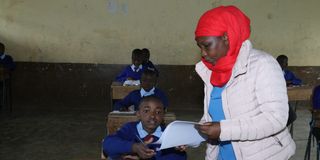
An invigilator distributes question papers to Grade six learners at Michinda Boys Day and Boarding School in Elburgon, Nakuru County during the Kenya Primary School Education Assessment on October 28, 2024.
However, it does not have an impact on the placement of a learner.
During President Kenyatta’s tenure, Sh26 billion was pumped by the World Bank to build infrastructure in secondary schools in preparation for the learners in junior school.
The upgrade included construction of laboratories, classrooms, improvement of the quality of teaching, retention of learners, support for the transition from 8-4-4 to CBC and monitoring and evaluation of the entire project.
However, this was reversed by President William Ruto’s government and Grade 7, 8 and 9 are now hosted in primary schools.
This was one of the recommendations of the Presidential Working Party on Education Reforms (PWPER) chaired by Prof Raphael Munavu. The team had been formed by the Ruto administration after taking over in September 2022.
“Both private and public primary schools today stand at 32,000 while secondary schools stand at 10,000. This mix-match will clearly continue to frustrate our efforts to deliver a 100 per cent transition to secondary education. This is one the reasons that may have informed the working party towards hosting JSS in our primary schools,” said the President.
The decision to domicile junior school in primary schools was opposed by the Kenya Union of Post-Primary Education Teachers (Kuppet) and the Kenya Secondary Schools Heads Association (Kessha).
“I am sorry but 92 per cent of the stakeholders recommended that the JSS be domiciled in the existing primary schools. We are a people-centered government, we listened to the people there’s nothing we can do currently. But from a personal perspective I agree with you, it would have been desirable for students to spend more time in Senior School. It's a discussion we need to think through,” said then Deputy President Rigathi Gachagua in 2022 when he officiated the opening of the Kenya Secondary Schools Heads Association in Mombasa.
This came as complaints continued about teacher shortages. To address staffing challenges, the Kenya Kwanza administration has so far employed some 76,000 teachers to teach in junior school and retooled others.
“We have ensured that in each JS (junior school), there are enough teachers capable to ensure learning is ongoing. Of course, we have a few challenges but we are working towards increasing more teachers. These are teachers under sciences where we had a shortfall. It is untrue to say there are no teachers,” said Mr Ogamba in an interview with Nation recently.
Mr Ogamba has also announced that national schools will offer the three pathways due to capacity and infrastructure.
This is likely to bring back the cut-throat competition for schools, the very disease CBC aimed to cure. There are around 105 national schools.
The pathways are social sciences, arts and sports, and science technology, engineering and mathematics (STEM).
“I urge all of the schools represented here to adopt the triple pathway category owing to your superior status in staffing, infrastructure and history of academic performance. Under the arrangement, we will also encourage schools to offer boarding and the day sections,” said Mr Ogamba when he addressed principals of national school in Mombasa on Wednesday.
Just two months ago, the former Education PS Dr Belio Kipsang announced that mathematics would be optional in junior school but that has now been reversed.
Grade 9 learners will undertake their assessment in November for transition to senior school next year.

